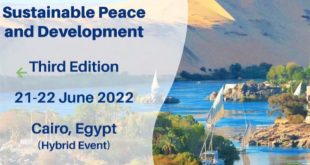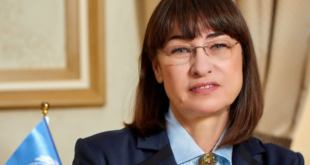The holy month of Ramadan is an opportunity for Muslims to rejuvenate their lives, ruling out the race to excess that has sometimes intruded in recent years.
Amina Khairy*
Ramadan Kareem. The holy month of fasting; refraining from eating and drinking, among other things, from dawn to dusk has started. Without any exaggeration, surely Ramadan in Cairo is unique. A lot can be said about what is happening in Egypt and what is happening to Egyptians.
The vast majority of Egyptians love Ramadan. Even the not so pious, and those who do not keep Ramadan voluntarily, in other words not due to illness or the heavy nature of their work, have a soft spot for Ramadan. A friend once likened Ramadan to an old member of the family whom everybody loves and respects, even those who might be bored when he starts to tell old stories.
Caring about Ramadan and its special religious and cultural habits and customs is part and parcel of Ramadan’s special status in Cairo; the festive mood that neither exams nor inflation can mar remains capable of embracing everybody.
However, not everybody is holding on to the original spirit and real aim of Ramadan. Over the past four decades or so, there have been signs of encroachment on Egypt’s culture, customs and forms of religion.
As researcher Patrycja Sasnal argues in her book Saudi Arabia: On the Inside Track in Egypt, Egypt over the past half century “has become more socially conservative. A plethora of political and social conservative stances — such as xenophobia and ostentatious religiosity — have taken root… [Contrasting with] the 1950s when Egypt was a secular, revolutionary, modern republic, in which moderate Hanafi and Shafai religious jurisprudence prevailed.”
The opposite of what prevailed in the 1960s and early 1970s has now become the norm. Instead of a moderate religiosity based on good deeds and a personal relationship with God, a different form of religiosity has taken hold. Sasnal describes what has happened, saying that conservative returnees from the Gulf “made” the Egyptian economy of today, with both its good parts and its deep-seated problems.
It was largely thanks to them and their children that Egypt’s population has doubled in size since 1980. This has led to the challenges of overpopulation, including questions about the availability of food and proper housing. These worsened Egypt’s economic stagnation, adding to a radicalising cycle of discontent, and this process of supplanting the rich cultural traditions of Egypt with narrow ones imported from abroad has not ended.
We have seen a separation of male and female workplaces, the formal and factual subjugation to bosses, and an extremely conservative social space. There has also been obligatory prayer and Friday sermons delivered by extremist imams. There has been no mixing of the sexes in the streets, or when visiting friends or at schools, as well as the introduction of full body covering for women.
This introduction of extremist ideas has changed the face of what was once the most modern Arab country in just a few years. What has been damaged in a few years can take centuries to regain. Regaining Egypt’s once modern, moderate, and yet more disciplined society will take a lot of work, something that has been seen by the recent courageous steps taken by Saudi Arabia in the same direction.
While Saudi Arabia has for many years been a role model and pattern of life for the millions of Egyptians who have worked and lived there, it is now taking a leap away from conservatism and opening up to modernity. Yet, Egyptians who have done a great job in replicating the Saudi ultra-conservative way of life in Egypt are still clinging to the older model with all their might.
Observing the social-media wars of words going around in Ramadan can say a lot about what has happened to Egypt. Well-educated and thus supposedly cultured engineers, doctors, lawyers, teachers and others have been leading what they see as war to defend Islam and Muslims against the sinful and malicious acts of impious infidels who are objecting to using microphones to air the tarawih (prayers performed during the night in Ramadan).
Despite the fact that the majority of those objecting to the loud and intrusive and more often than not interposed sound of the recital of the Quran and the recital of prayers are fellow Muslims, the imported and blindly adopted version of the ultra-conservative electronically amplified form of Islam has announced the upper hand.
Upper hands dictating specific forms of religion do not necessarily represent what they think they are supposed to be. They might represent what is known as an ochlocracy or the rule of the mob. The mob in modern times does not always suggest gangsters and criminals. It might be made up of ordinary citizens who have been subjected to extreme and organised brainwashing that has made them believe that they alone represent true Islam.
This process has been going on for the past four decades in schools, universities, government and private institutions and even social gatherings in Egypt, where people have been subjected to coercive persuasion in the name of religion and made to think that ultra-conservatism and Islam are the two sides of one coin. They have been trained to believe that the imported form of religion is the only right form of Islam, and all other forms of interpretation or even argumentation are infidelity, impiety or twistedness that should be corrected by force.
Force takes us back to the rule of the mob, which by definition is “rule by the mass of the people and the intimidation of the legitimate authorities”. This intimidation can take two forms: the first succeeds due to feelings of sympathy towards the mob, thus voluntarily allowing whatever the mob see as right; the second happens when the rule of the law disappears for whatever reason.
The reasons why imported and ultra-conservative non-Egyptian forms of religion have succeeded are numerous. One can pin point a few in Ramadan. The holy month is and always will be a golden opportunity for Muslims to rejuvenate their lives. In the past, this rejuvenation was done via cultured and well-mannered ways of approaching the Creator, asking for forgiveness and hoping for blessings.
Today, it is done via the mob, as if it were a competition to produce the loudest noise, the one that is most intrusive in other people’s lives and decisions, and as if there were a competition going on for the highest record in sending electronic messages asking fathers, brothers and husbands to cover up their daughters, sisters and wives so that pious men can fast more easily. It is as if there was a race to be seen most often going to Tarawih prayers and producing the loudest prayers penetrating walls and ears.
The race to excess that has taken the upper hand in Ramadan in Egypt requires urgent cultural, social, religious and above all legal corrections. The worst and most critical dangers come from social and cultural norms that camouflage themselves as “religious” teachings.
And while Ramadan continues to be unique in Egypt, it also needs to continue to tell all Egyptians of its need to be restored.
*The writer is a journalist at Al-Hayat newspaper.
From: Al-Ahram Weekly






